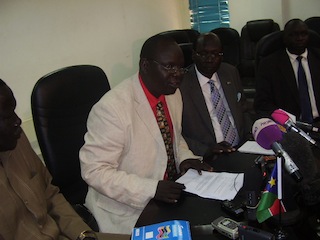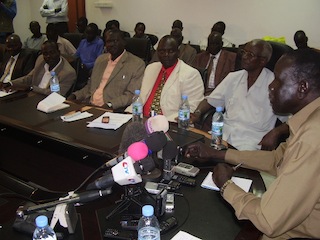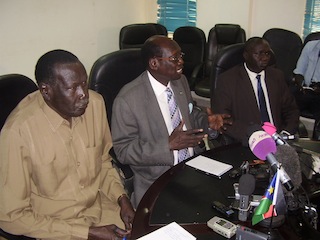Emergency assistance sought after hunger kills 10 in E. Equatoria
February 6, 2013 (JUBA) – South Sudan on Wednesday made an emergency appeal in order to avert a looming hunger crisis in Eastern Equatoria state, saying lack of food items has forced villagers there to sell their livestock amid reports that more than 10 people have died.

“We are in a difficult, very very difficult situation which needs immediate action. We have come here [to Juba] to raise an alarm of the hunger situation in Greater Kapoeta. As we are speaking here, people are dying of hunger and already we have more than 10 people, especially women who were found to have died of hunger,” Iko told a news conference on Wednesday.
Kapoeta South county’s commissioner, Martin Lorika, who also spoke at the news conference, urged the government to quickly intervene, adding that people in the area are losing all their chickens, goats and cattle which they sell to sustain their families.
“Goats and cattle are being sold. If you go to Greater Kapoeta, you find that all the markets are being flooded with livestock but there is no food to buy. Also there are no people buying cows. It is a terrible situation. Our people did not harvest anything this previous season,” said Lorika.
“People in this area are now travelling to far away areas, where they buy a bucket of maize for more than 300 South Sudanese pounds and it is not even available”, he said, adding that the food shortages had resulted in a serious depletion of livestock in the area.
“It is even worse for me as the village head because desperate people in the area come to me for help. When we receive grain, these are the people that I then target first.”
Lorika said the supply of grain from international relief organisations in the area was not only inconsistent, but was also not enough to cater for the needy people in his area.
“In my house also, I have more [then] 42 families. When I get something, I struggle to find out how to distribute them among the most affected families,”
The other problem, he said, was the lack of seeds to grow new crops. You don’t find grains around. So we are calling on our brothers from other states, especially business people to quickly take grains from wherever they will find them to the area so that our people are rescued from hunger”, Lorika said.

“One third of this appeal has been made. Despite economic crisis all over the world today, some donor countries were able to honour their pledges,” he said, adding over 4 million people would need food assistance countrywide this year.
Acuil, who was speaking at the same news conference, said he had witnessed places where families have reduced the number of meals they take per day as the food security situation worsens.
“We already witnessed people who have started selling their livestock at distress prices. We also hear of people starting to cut the number of meals they have per day, which is a clear indication that the food security situation is worsening,” he said.
He called on the government to construct new roads before the next rainy season so that inaccessible areas can be reached.
“I want you people, especially the adviser to the president to whisper to the president’s ear so that he instructs the minister of roads and bridges to ensure emergency roads are constructed immediately. [The] WFP (United Nations World Food Programme) has food but this food cannot be delivered to some of the affected areas because there are no roads. They are not passable”, Acuil said.
Erratic rainfall patterns, decrease in acreage, poor agricultural practices and unsuitability of crops grown in certain areas are, according to the minister, some of the major causes of food shortages in the area.
The food crisis in South Sudan requires long-term solutions and the government is launching a strategic plan to increase food production across the whole country this year.

“We have been trying to promote what we call community productive asset promotion … basically creating assets that can contribute to improve the food security situation in South Sudan, for example, rehabilitation of irrigation schemes,” he said.
Marial said the people of Greater Equatoria are part of South Sudan and that they must be shown solidarity because they have always stood with the people of the new nation from other state’s in the past.
“During the 2012 crisis with the government of Sudan, the people of Kapoeta went out in the villages to protest the aggression and made contributions which they sent to [the] frontlines to our soldiers. They did it because they are citizens of this country. So we must show this solidarity,” Marial told the news conference at the ministry of information.
(ST)
